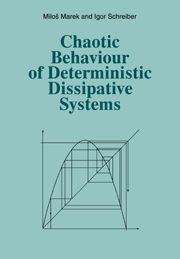Chaotic Behaviour of Deterministic Dissipative Systems
This is a graduate text surveying both the theoretical and experimental aspects of chaotic behaviour. Over the course of the past two decades it has been discovered that relatively simple, deterministic, nonlinear mathematical models that describe dynamic phenomena in various physical, chemical, biological and other systems yield solutions which are aperiodic and depend very sensitively on the initial conditions. This phenomenon is known as deterministic chaos. The authors present chaos as a model of many seemingly random processes in nature. Basic notions from the theory of dynamical systems and bifurcation theory, together with the properties of chaotic solutions, are then described and are illustrated by examples. A review of the numerical methods used both in studies of mathematical models and in the interpretation of experimental data is also provided.
- Chaos is one of the hottest subjects in science and engineering
- Deals with both experimental and theoretical aspects
- Good hardback sales
Product details
July 1995Paperback
9780521438308
380 pages
240 × 171 × 26 mm
0.818kg
Available
Table of Contents
- Introduction
- 1. Differential equations, maps and asymptotic behaviour
- 2. Transition from order to chaos
- 3. Numerical methods for studies of parametric dependences, bifurcations and chaos
- 4. Chaotic dynamics in experiments
- 5. Forced and coupled chemical oscillators: a case study of chaos
- 6. Chaos in distributed systems
- Appendices
- Bibliography
- Index.



